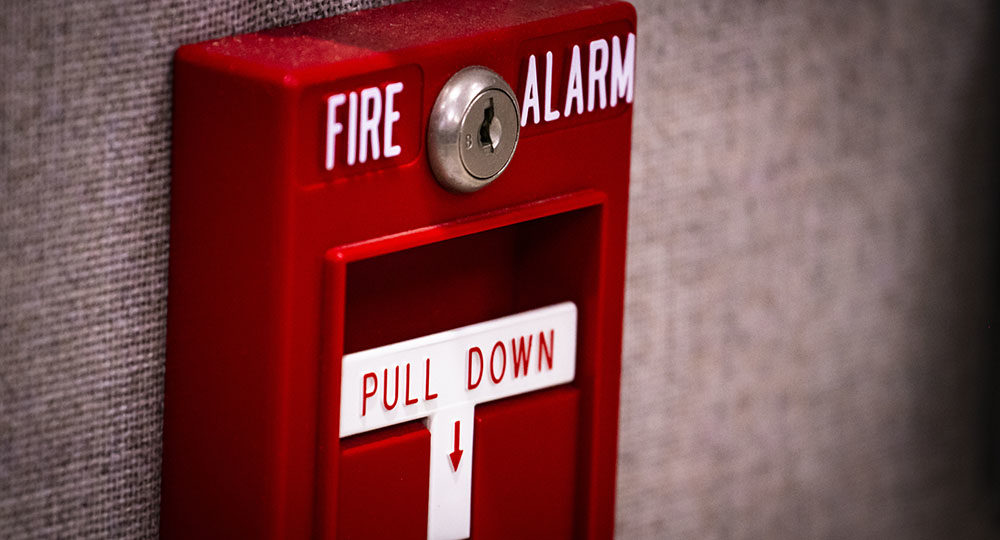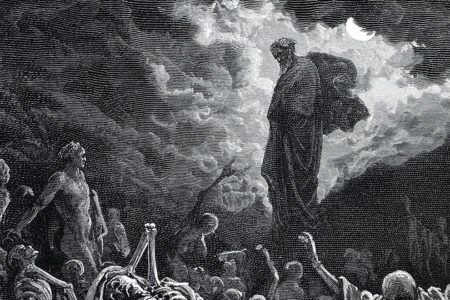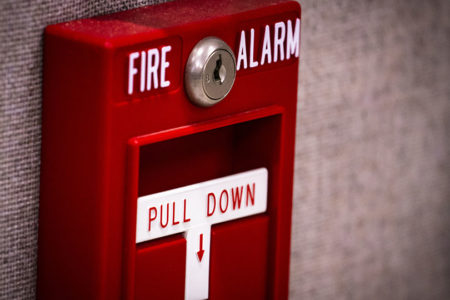Beware of a False Alarm
Suddenly the alarm sounded! Judging from the teachers’ faces, this was no drill. All of the students filed out quickly and quietly, looking around for signs of trouble. Ambulances and fire trucks were soon seen, and their earsplitting sirens pierced the air. Fire fighters jumped out of their vehicles and ran into the school building, which had been completely evacuated. Everyone concerned waited for some word to come. There was no fire to be seen. Why had the alarm gone off? The wait was short-lived. An explanation was soon forthcoming: It was a false alarm.
False alarms are not uncommon. I actually experienced the incident described above. It has happened to many others as well. Each time an alarm is sounded, it should be taken very seriously. Everyone concerned must be prepared to respond properly and promptly. However, if the alarm is false, time is wasted, human and financial resources are spent, and many innocent lives are placed in needless danger.
During the last few years, an alarm of a different sort has been sounding in the Jewish community. It originates from a small but fairly significant group of religious Jews called the Lubavitch. The alarm is actually a series of similar messages, which can be seen on huge banners draped across buildings in Jerusalem and on bumper stickers in major U.S. and Israeli cities: “Prepare for the Coming of the Messiah!” “We Want Moshiach Now!” “Messiah on the Way!” These messages are taken very seriously by some Jewish people. In fact, the excitement created by this message has reached fever pitch. The man who is the focal point of all this frenzy lives in a three-story brownstone home located at 770 Eastern Parkway in the Crown Heights section of Brooklyn, New York. He is regarded by many Lubavitchers as the most prominent man in the world.
His name is Menachem Mendel Schneerson. He has a PhD in electrical engineering from the Sorbonne in Paris. He is a Lubavitcher rabbi and, to many, a miracle worker. For an estimated 250,000 Jews the world over, he is the Messiah.
The hope for a Messiah is a doctrine burned into the very fiber of Judaism. The 12th of the 13 Principles of Faith clearly states, “I believe with perfect faith in the coming of the Messiah. Though he may tarry, I will await him every day.” Maimonides, who wrote the Principles, wanted to provide clear, concise statements by which to explain his faith.
More than two dozen individuals have appeared on the scene claiming to be or proclaimed by others to be the Messiah. Rabbi Schneerson is the latest. Each time a messiah has emerged, excitement has been created and people have been challenged to prepare for his kingdom. Great claims have been attributed to these false messiahs, including incredible Torah knowledge, miracles, and visions. Certainly not all of these individuals could have been the true Messiah. For whatever their individual reasons for making these claims, these men have misled people, wasted their time, spent their resources, and, many times, endangered their lives. When it comes to the topic of the Messiah, there have been many false alarms.
One of the best-known early messianic alarms to sound was in the person of Simon ben Koseva. Believed to be the Messiah by the famous Rabbi Akiva, Koseva was given the title Bar Kokaba, “star out of Jacob.”1 Bar Kokaba was looked upon as the great warrior who would remove the Romans from the land of Israel. In the year AD 135, after recapturing and holding Jerusalem for a short time, Bar Kokaba and his armies were defeated on the Judean hills at a place called Bethar. Several thousand Jewish people died, among them Rabbi Akiva and Bar Kokaba. This sounding alarm proved to be a fake.
Menachem Solomon lived in the 12th century during the first crusades. Calling himself David (because of his claim to be the king of the Jews) Alroy (a corrupted Arabic last name2), he started a messianic fervor using the persecutions of the time as proof of his unveiling in 1147. Said to be handsome and learned, he also reportedly was skilled in sorcery.3 Rumors circulated as to his miraculous powers. Alroy initiated a call for his people to return to Jerusalem, but before he had the chance to lead them, he was murdered. It is not clear who was responsible for his death. What is clear is that another false alarm had gone off.
Yet another alarm rang in the 1660s from Smyrna, Turkey. This time it was Shabbetai Zevi. He is credited with starting Shabbateanism, referred to as the most momentous messianic movement in Jewish history since the destruction of the Temple in AD 70.4 Zevi became very proficient in Kabbalah, a system of Jewish mysticism marked by belief in creation through emanation and a cipher method of interpreting Scripture. As a result, many young students desired to study with him. Living almost as a recluse, Zevi became what could be described as a manic-depressive. He did some very strange things, including taking part in a ceremony in which he “married” the Torah. His followers attributed his unconventional behavior to his unique position.
A young rabbi, Nathan of Gaza, in his own right a scholar and a mystic, met Zevi and almost immediately proclaimed him to be the Messiah. Messianic fervor swept through the Jewish population. Literally thousands of Jewish people followed him, believing that he would lead them back to their promised land. In the year 1666, Zevi was imprisoned by the sultan of Turkey. While in prison, he did the unthinkable. This man who had been proclaimed the Jewish Messiah converted to Islam. A definite false alarm!
Each time a messianic imposter has dashed the hopes of the Jewish people, the belief in that doctrine has deteriorated a little. As a result, the majority of the Jewish people have become more and more like the story of an old Russian Jew who was without a job. The community hired him, at a salary of one ruble a month, to get up at dawn and wait on the hill outside the town to welcome the Messiah, should he arrive. Asked how he liked doing it, the man replied, “The pay isn’t much, but it’s a steady job.”5
It does seem, however, that the world is ripe for a Messiah to come. Thousands of Jewish people are returning to their homeland. The Soviet Union has been dismantled, and there is a spark of hope for peace in the Middle East. At the same time, we see the need for a wise, strong, charismatic leader.
Rabbi Schneerson has impressive credentials. He has been regarded as a Torah scholar since he was a child. He is the seventh rabbi of the Chabad Dynasty and, according to their tradition, the last rabbi before the arrival of the Messiah. He is said to have healed the sick and caused the infertile to bear children, and many of his predictions about the future have come true. Some believe that he need only speak and the weather will change. Schneerson has generated so much enthusiasm that his followers have built a brownstone house in Israel, an exact replica of his home in Brooklyn, for when he takes up residence there. They say of him, “Moses was the first redeemer, the Rebbe is the last.”6
The Rebbe has never stated publicly that he is the Messiah, but he has never denied it either. Currently, he is unable to speak at all. In March 1992 he suffered a stroke that left him paralyzed on one side. His faithful followers say the stroke is further evidence of messiahship. They cite Isaiah 53:4–5 as a proof text: “Surely he hath borne our griefs, and carried our sorrows; yet we did esteem him stricken, smitten of God, and afflicted. But he was wounded for our transgressions, he was bruised for our iniquities.”
His followers are to be commended for using the Bible as a guide to the identification of the Messiah. Their claims, however, illustrate the danger of imposing conclusions that do not meet the biblical criteria of messiahship. The prophetic Scriptures do have a great deal to say about the Messiah.
When I was a boy, I collected baseball cards. Occasionally I would get a card that had the title “Checklist” written across the top. It listed the numbers of the cards in a particular series, along with the names of the players. Next to each name was a little box to check off when that card was obtained, enabling collectors to know which cards they had. It was a quick way to keep inventory and to know which cards were still missing. In like manner, if the Rebbe—or anyone else—claimed to be the Messiah, he would have to be able to check off all the boxes of fulfilled prophecy. Any unchecked boxes would mean a false alarm.
Without citing all the prophecies, it can be easily determined that the Rebbe falls far short in his messianic credentials. He was not born of a virgin, nor was he born in Bethlehem. In fact, he has never set foot in the land of Israel. He cannot prove that he is from the tribe of Judah or that the scepter has not departed from that tribe.7 The list goes on and on. It is very clear that the Rebbe is another false alarm.
The messianic fervor surrounding Menachem Schneerson, even coupled with the zeal of his followers, cannot make this 91-year-old, infirm human being the long-awaited Messiah. These modern-day believers will experience the same disappointment and disillusionment as others before them who, through the years, put their trust in men not sent from God. Indeed, false alarms are costly.
Almost two thousand years ago an alarm sounded. It was an alarm calling people to repentance. Most of the people thought it was a false alarm, and they did not heed the call. But that time, the alarm was real. Jesus is the promised Messiah, the real thing. Anyone can quickly run down the checklist to verify it.8
The banners and bumper stickers serve as valuable reminders to everyone. The difference between believers and unbelievers is that believers await His Second Coming. He came the first time as the Lamb of God to save sinners. He will come again as the Lion of the tribe of Judah. Every one of us will meet Him one way or the other.
PREPARE FOR THE MESSIAH NOW!
ENDNOTE
- Numbers 24:17.
- Encyclopedia Judaica (Jerusalem: The MacMillan Company), Vol. 2, 750.
- Ibid.
- Ibid., Vol. 14, 1219.
- Moment Magazine, April 1993, 37.
- Ibid., 32.
- Isaiah 7:14; Micah 5:2; Genesis 49:10.
- See “Will the Real Messiah Please Stand Up,” tract by Will Varner (Bellmawr, NJ: The Friends of Israel Gospel Ministry, Inc.); see also “Portrait of the Messiah,” Israel My Glory magazine, Vol. 50.5, October/November 1992.








